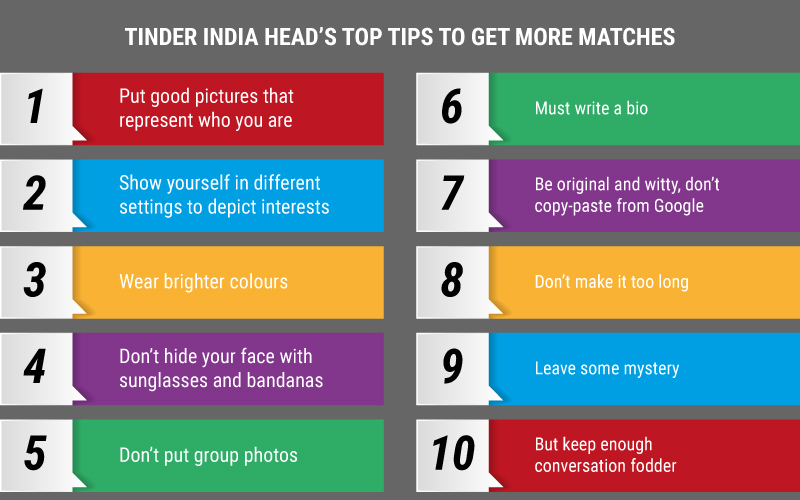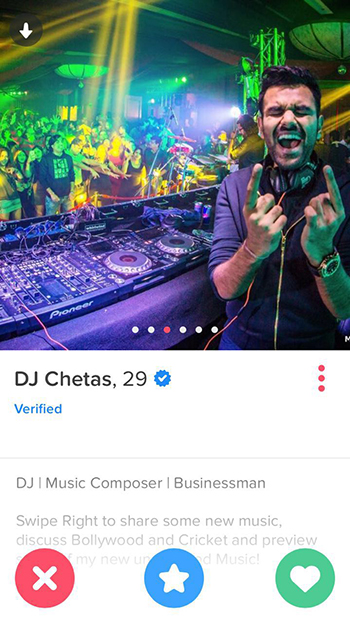It’s a hot sunny afternoon in Delhi and I have a posh date in an upscale hotel here. No, it’s not a Tinder date, but I am meeting Tinder’s India head, no less.
Taru Kapoor, 29, a Harvard Business School graduate, was born and brought up in Delhi and received her B.Tech and M.Tech degrees in chemical engineering from IIT-Delhi. She joined the US-headquartered Tinder in January this year, when the company launched its India operations — its first office outside the US. In her previous stints, she worked with Sequoia Capital India and The Boston Consulting Group.

Sipping on a cup of cappuccino and biting into a cookie, Kapoor remarks that Tinder is more than just a dating app. A recent survey by the company has revealed that most users are on the platform to meet people, and not necessarily date.
“We asked people what they were looking for on Tinder, and the first answer was ‘meeting new and interesting people’. The second answer with a fair margin was ‘dating,’” she tells me.
In what is almost a revelation to me, she goes on to comment that people are actually even getting hired through Tinder.
“Did you say hired?” I ask her. Sensing my disbelief, she explains, “Lots of people are hired on Tinder, by the way. They (employers) find young people, especially if they are looking for people who are passionate about a certain thing… photographers, writers… Some of those skills are just harder to recruit for.”
In what is almost a revelation to me, she goes on to comment that people are actually even getting hired through Tinder.
“I met someone the other day who runs an NGO and he was looking for interns. It’s hard to find people because it’s passion that drives people in the NGO sector. He found them on Tinder — people who are really passionate about the social cause they work for — and he was very excited. Like it’s a perfect match.”
Well, there’s a newer connotation of the phrase ‘perfect match’!
For first-timers, let me explain how Tinder works. If you like someone and want to connect, you ‘swipe right’ on their profile, if the other person too swipes right on you, then it’s a ‘match’ and you can start chatting. Swiping left is basically a ‘nope’.
A specific feature of Tinder is that you cannot just approach anybody and start a conversation unless it’s a ‘match’, ensuring a sense of privacy on the platform.
It also offers a feature called ‘Superlike’, which tells the other person that you’re “really interested” in them. Of course, it’s up to them if they want to swipe right or left on you. Regular users can use only one ‘Superlike’ a day, while Tinder Plus users get up to five. Tinder Plus users also get a Tinder passport, which means they can swipe in any location in the world, whereas regular users are restricted to the area they are in, up to 161 kms. Tinder Plus is a paid service and costs Rs 612 a month.
Well, there’s a newer connotation of the phrase ‘perfect match’!
So how does one exactly hire or get hired on Tinder?
“Sometimes people put it in their profile , sometimes it happens by chance. You see something in somebody’s profile that catches your attention and you swipe right on them… sometimes it’s intentional and sometimes it happens by chance.”
There are many entrepreneurs, particularly start-up entrepreneurs, hiring on Tinder, Kapoor tells me, without revealing numbers or names.
In December last year a UK startup CEO had in fact revealed that she uses Tinder to recruit.
It’s a match!
From hiring, the conversation veers towards discussing Tinder ‘hacks’. If one wanted to gauge ‘what works’ or learn a few tricks to popularise a Tinder profile, what’s better than hearing it from the Tinder India head herself?
So I begin by mentioning that a lot of my friends, especially males, complain about not getting ‘enough matches’ on the app. Kapoor doesn’t comment on the gender ratio on Tinder, an important question that keeps coming up in discussions about why many men face difficulty in getting dates.
But she does list out a set of do’s and don’ts for Tinder users.
Avoid putting up selfies and group photos, she says. Getting good pictures clicked in different settings that depict your interests is a great idea. “If you like reading or if you play music or if you went on a trip… I mean show different personalities, show different sides of you. It’s a reflection of who you are, your chance to make a first impression.”
With a wry smile, she also goes on to suggest that users not “hide their faces with sunglasses and bandanas.”
But she does list out a set of do’s and don’ts for Tinder users.
“And you must write a bio because your chances of getting matched are like 98% lower if you don’t have a bio.” She does warn though that the bio should not be long, or copy-pasted from Google: “Use it to showcase who you are and what you’re looking for. Be witty, don’t copy-paste from Google, leave some mystery so you don’t have to write a novel but leave enough conversation fodder.”

Celebrities on Tinder
Last month, Hollywood star Zac Efron shared his experience of being on Tinder and not getting anyone to swipe right on him, because most people assumed it was a fake profile .
Kapoor laughs about it and says the company has since verified his profile. A verified profile on Tinder is much like the ones on Twitter and Facebook, and comes with a blue tick.

“There are lots of celebrities on Tinder and with famous people, you might sort of go… ‘is it really him’ kind of thing, that’s why we verify the profile as soon as we get to know, but we don’t always know,” says Kapoor.
In India too, there are celebrities on Tinder but Kapoor tells me “there aren’t that many who are public, but it’s increasing.”
“It’s very normal abroad, but in India there’s a lot more scrutiny,” she says revealing that former Australian cricketer Shane Warne too has been a Tinder user.
In India too, there are celebrities on Tinder but Kapoor tells me “there aren’t that many who are public, but it’s increasing.”
One of India’s most prominent DJs, DJ Chetas, joined Tinder recently and has a verified profile. “He’s using it to connect with his fans basically, he plays a lot in different cities, he talks to people who are interested in music, asks them what kind of music they like, tests out his unreleased music on them and generally gets feedback,” says Kapoor.
When there are other social media platforms to connect with fans, why Tinder, I ask her. “The only difference is one-on-one. Facebook is a one-to-many platform, so the quality of engagement is just different. Tinder facilitates one-on-one conversations.”
Inhibitions are dropping
Although Tinder set up an India office early this year, the app has been live in the country for four years. However, from a critical mass perspective, the app has been going strong for around two and a half years in the country.
Kapoor believes that the initial skepticism and inhibitions around the app are now gone. She talks about how cultures expand and how technology has played a role in making the world a smaller and more connected place, in reply to my question about Indian youth embracing Tinder readily.
“Initially, when fewer people were on it, people had inhibitions about a dating app. It’s changed very rapidly, and see, it’s an accepted part of our lifestyle and popular culture today. Meeting people is important — like, how else do you meet new people?” Kapoor says.
As a matter of fact, India is one of Tinder’s top 5 markets in Asia.
With new technology there is always some skepticism; people were skeptical about cellphones 15 years ago, says Kapoor. “When you swipe a few times, you realise, okay this is interesting, this is easy, this is intuitive. And look — there are just perfectly, nice, normal, good people on there and if everyone’s on there then, you know, why not?”
As a matter of fact, India is one of Tinder’s top 5 markets in Asia.
Indian women and Tinder
In a country like India, questions may be posed about the liberating potential of an app like Tinder, especially for women. I ask Kapoor if she thinks Tinder has played a role in helping women express their sexuality more openly.
While abstract at first, she goes on to comment: “Tinder is very empowering because if, as a woman, I walk up to someone and if I’m interested in them and I say ‘hello’, there’s going to be this sense of judgement. I don’t know what they’re going to think of me. There’s always been this huge psychological barrier, structural barrier to just expressing yourself and go look for whatever it is that you’re looking for. It’s hard for everyone to meet new people, but it’s way harder for women.”
She suggests that having a platform like Tinder tends to give women a sense of control and comfort: “You share as much information about you as you want and when you want. And that gives you a lot of power.”
Copycat apps
Before we wind up the hour-long conversation, I ask her about Indian copycat apps that have been flooding the market. “We don’t really worry about competition. We are market leaders by a very wide margin. Lots of companies come, go, copy, die, de-grow all the time. I think ultimately the platform that delivers the best experience will win, that’s it,” Kapoor assures us as she signs off.
Subscribe to FactorDaily
Our daily brief keeps thousands of readers ahead of the curve. More signals, less noise.
To get more stories like this on email, click here and subscribe to our daily brief.
FactorDaily is owned by SourceCode Media, which counts Blume Ventures among its investors. Blume Ventures is also an investor in Dunzo. None of FactorDaily’s investors have any influence on its reporting about India’s technology and startup ecosystem.









